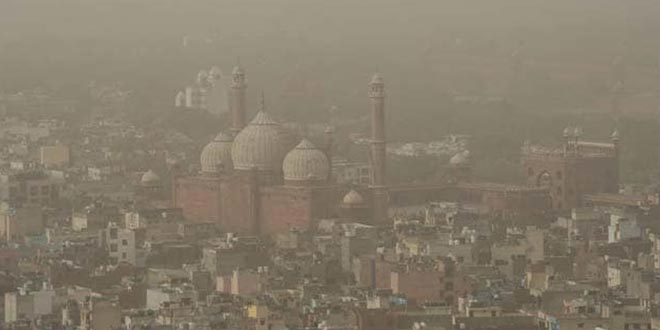New Delhi: After few days of ‘good’ air quality in the national capital, the pollution level has gone up due to local factors, officials said ON Sunday. The Air Quality Index (AQI) was recorded at 159, over four times more than on last Tuesday, according to the Centre’s System of Air Quality and Weather Forecasting and Research Institute (SAFAR). An AQI in the range of 0-50 is considered ‘good’, 51-100 ‘satisfactory’, 101-200 ‘moderate’, 201-300 ‘poor’, 301-400 ‘very poor’ and 401-500 ‘severe’. A Central Pollution Control Board (CPCB) official said the rise in pollution level is due to local factors especially the vehicular pollution. “After the monsoon subsided, the local reasons resulted in an increase of pollution in the city”, the official said.
Also Read: Delhi Government Directs Departments To Be Ready With Anti-Pollution Measure Ahead Of Winters
According to the data from the CPCB, the PM10 (particulate matter) level (presence of particles with a diameter less than 10 mm) was recorded as ‘moderate’ at 171 in Delhi-NCR and 167 in Delhi. The PM2.5 level (presence of particles with a diameter less than 2.5 mm) was 81 in Delhi-NCR and 85 in Delhi. The Supreme Court appointed body Environment Pollution Control Authority (EPCA) has called for a meeting next week to explore possible solutions to control local factors responsible for the rise in pollution. According to the SAFAR, the pollution level is expected to further increase in the next two days, especially the PM10 level. Monsoon rain had improved the air quality in the last two months. Since July, the air quality remained ‘satisfactory’ and even witnessed three days of ‘good’ category.
NDTV – Dettol Banega Swachh India campaign lends support to the Government of India’s Swachh Bharat Mission (SBM). Helmed by Campaign Ambassador Amitabh Bachchan, the campaign aims to spread awareness about hygiene and sanitation, the importance of building toilets and making India open defecation free (ODF) by October 2019, a target set by Prime Minister Narendra Modi, when he launched Swachh Bharat Abhiyan in 2014. Over the years, the campaign has widened its scope to cover issues like air pollution, waste management, plastic ban, manual scavenging menstrual hygiene. The campaign has also focused extensively on marine pollution, clean Ganga Project and rejuvenation of Yamuna, two of India’s major river bodies.






























